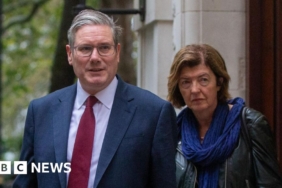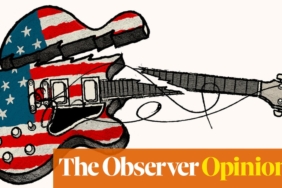Bu içerikte, Amerika’da gerçekleşen seçim öncesinde farklı vatandaşlık durumları ve oy tercihleri üzerine odaklanan bir haberden alıntılar bulunmaktadır. Christopher La Rose’un Amerikan vatandaşlığına geçişi ve ilk oyunu Kamala Harris’e vermesi gibi detaylar yer almaktadır. Ayrıca, seçim gününe dair farklı eyaletlerde yaşanan olaylar, seçmenlerin tercihleri ve seçim atmosferine dair yansımalar da içeriğin önemli noktaları arasında yer almaktadır. Oylama gününe dair detaylar, seçmenlerin tercihleri ve seçim atmosferine dair çeşitli görüşlerin ve olayların yer aldığı kapsamlı bir içerik bulunmaktadır.
Kaynak: www.theguardian.com
America had previously always been “somebody else’s country,” said Christopher La Rose, a health researcher, as he waited just before 7am in Pine Lake, a village that’s too small for postal delivery just outside of Atlanta, Georgia.
But that changed recently for La Rose, who is of Guyanese descent, when he became an American citizen. He had the jitters on Monday night, before using his first-ever vote in a US election to back Kamala Harris.
“I am sincerely concerned about the way that the country could devolve if the other chap got into office,” La Rose said. “I’m concerned about the political party that has coalesced around him, and how they have, in my mind, lost their way, and I’m voting to protect my kids.”
Georgia is one of the seven swing states where election results are close enough to fight over and voters in all of those states say they definitely feel fought over.
At a busy polling place in Scottsdale, Arizona, the conservative youth organization Turning Point brought out a bright pink party bus adorned with “Trump train” signs, which they will use to take voters to other Scottsdale polling places if the lines become too long. The group also put up signs imploring voters to stay put: “stay in line, don’t leave your country behind,” one sign said.
A man was also gathering signatures for America Pac, Elon Musk’s group that is paying circulators to sign up other people who could win a $1m prize. “Elon Musk needs our help,” the man told one voter.
Musk’s controversial effort to drive turnout is late to the race. In many swing states, most people who are going to vote have already done so. More than 80 million people cast ballots before election day across the country, with 4 million in Georgia alone – 80% of Georgia’s 2020 vote total.
Georgia’s in-person votes will be counted and announced about an hour after polls close at 7pmlocal time, elections officials said last week. Georgia officials have meticulously tried to avoid giving election integrity denialists something to wrap a grievance around this year. The election interference attempts of 2020 still resonate.
Gabriel Sterling, election operations chief for Georgia’s secretary of state, at midday on Tuesday that all polling locations were working smoothly, with an average wait – if there is a wait – of two minutes and an average check-in time of 49 seconds.
Cyndi Keen, a lifelong Republican, voted a straight Republican ticket on Tuesday. “When it comes down to looking at having a better life for my children, for my grandkids and for myself, I like the Republican policies better,” she said. She thought the results will be close – and her household had voted for different candidates. “I’m in a house divided, my sweetie went the other way. He’s straight Republican but he voted for Harris.”
Cathy Garcia, an activist with the Working Families party from Santa Fe, New Mexico, flew to Atlanta this week. Tuesday morning with eight hours to go, she was beating on doors in Atlanta’s south-eastern suburbs, looking to put the last voter in line. She was accompanied by a far-flung team visiting from safe Democratic states – Massachusetts, California, New York – putting in work where it might count the most.
They wrestled with the cellphone app showing them where to find clusters of registered voters who had not yet voted. The apartment complex in south DeKalb county gave them some density to work with, but low-income people tend to be more transient … and less likely to be at home in the middle of the day.
Their effort demonstrates the effort the campaigns are making to get every last voter they can to a poll.
Kamala Harris was spending the day on Tuesday at the Naval Observatory, the vice-president’s residence in Washington. The public is not expected to see the Democratic nominee until Tuesday night, where she is poised to deliver remarks at Howard University, her alma mater, in Washington DC. But she has been blitzing radio stations with calls across the country in a last-effort push for votes.
Trump has ratcheted up outrage in the waning days of the election, wrapping himself and Republican voters in the politics of extreme grievance over descriptions of himself and his supporters as “garbage”, Nazis and fascists. And yet, his comments at rallies have included increasingly strident attacks on undocumented people, who he has called “animals” and “monsters”, and personal attacks on Harris.
Trump partisans have cheered him on and adopted his tone.
“He’s a big daddy. He’ll smack you if you’re an asshole,” said Joanne Kelchner, 77, a retiree from Bethlehem, Pennsylvania, who voted for Trump had harsh words for Harris. “Why is she not proud of her Brahmin heritage?” Kelchner asked. “I mean the elite class of India and pretending that she’s not Black, whatever … God bless us all.”
But partisan rancor abounds.
“Donald Trump is crazy. I mean, he’s a lunatic and the people I think that vote for him are lunatics because he is crazy,” said Jeannie Strickland, a retiree from Georgia. “He’s trying to get people revved up to fight for him. I think if they put his butt in jail, like they should have done at least two years ago, it might calm him down a little bit, but they don’t do anything to him. I’m scared he’s going to win, and I might have to find an island somewhere and go live somewhere else, because he likes Hitler, and he liked the things Hitler did.”
Both sides have armies of lawyers in anticipation of legal challenges on and after election day. And law enforcement agencies nationwide are on high alert for potential violence.
Tensions briefly flared outside a polling site in a library in downtown Phoenix, where a group of men decked out in American flag T-shirts had gathered to wave “Union Yes for Harris Walz” signs. As another man in a truck drove past, he hollered at the men: “Fuck you!”
Angel Torres Pina, a 21-year-old who serves in the military and who voted for the first time on Tuesday, wanted politics to become less divisive and fear-based. He was somewhat nervous about voting at the library at all. “Am I making the right decisions? Am I making the wrong decisions? Are people gonna bad-talk about me because I voted for what I believe in?” said Torres Pina, an independent who voted for Harris. “I keep seeing on the news about these riots, these protests, these chaos, and it makes me a bit scared for if I’m voting right or wrong.”
While many Americans have described how stressful this election is, Dawn Alter, a 50-year-old sales representative from New Berlin, Wisconsin, was in good spirits on Tuesday morning. Alter was supporting Harris, and thought the vice-president stood a chance in Wisconsin – a key swing state.
Alter believes Trump has shed support here since 2020, and viewed herself as evidence: she abandoned Trump after supporting the former president in 2020, saying she was tired of the division and “negativity” he has sowed.
“It’s a lot of discord, there’s too much misinformation,” said Alter. “There needs to be change and unity – I think those are the two biggest things for me.”
In 2016, Wisconsin voters elected Donald Trump by less than a percentage point, and in 2020, the state flipped for Joe Biden by a similarly narrow margin. Polling suggests the presidential race in Wisconsin is essentially a toss-up, and voters were acutely aware of the uncertainty they face.
Matt Steigerwald, a college lecturer from Wisconsin, said he was “cautiously optimistic”, adding: “Wisconsin is probably going to be pretty tight.” Steigerwald, who joked that he was a “bleeding-heart liberal”, said that even as a left-of-center voter, he found Trump “especially abhorrent”.
“I just don’t know how you can support somebody who’s said and done so many awful things, who treats women so poorly, who treats people of different races so poorly – he’s just an awful human being from my perspective,” said Steigerwald.
Additional reporting by Carter Sherman, Alice Herman, Sam Levine and Rachael Leingang
Read more of the Guardian’s 2024 US election coverage



Yorumlar kapalı.